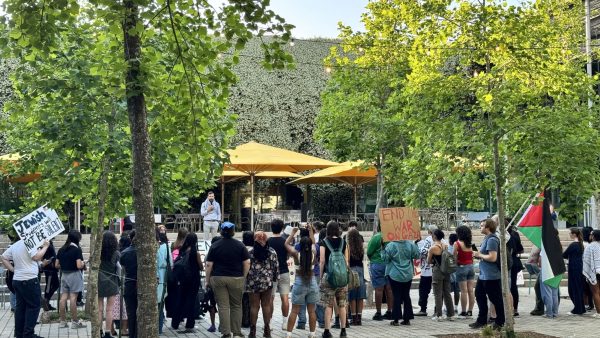Our campus conversation about the Arab-Israeli conflict lacks context
October 30, 2019
Through all the debate over Israel that happens on Tulane’s campus, it seems that one crucial idea consistently slips through the cracks: criticizing Israel isn’t anti-Semitic. The trouble comes when criticism turns to demonization of Israel and the Jewish people who reside there, or when inadequate or misleading context is used to back up arguments.
The Hullabaloo has frequently covered issues related to Israeli politics this semester, with debate going between opinion articles and Letters to the Editor. They lack true context of the debate and have been rooted in the narrative of Palestinian oppression, which is one-sided and drives anti-Semitism.
Go ahead and criticize Israel. But please, try to be educated when you do. This debate students are engaging in on campus is rich in evidence supporting both sides. Have an opinion, but if that opinion is that the Jewish people don’t have a right to live in Israel, think again.
Pinkwashing Israeli politics at Tulane https://t.co/6IuoOjXpYD pic.twitter.com/iK6fpTYhWi
— The Tulane Hullabaloo (@thetuhullabaloo) October 3, 2019
The conflict today is largely centered on who has the right to live on the land that comprises present-day Israel.
How far back in history is it reasonable to go in search of the answer to this question?
Jerusalem has been captured and recaptured 44 times. It has bounced back and forth between Jewish control, control by Arabian nations, control by Christian crusaders, and other regimes. That area was first settled circa 3500 B.C.E, and it changed hands for the first time around 1200 B.C.E.
Every 75 years on average since then, something akin to the ethnic cleansing that pro-Palestine groups claim is happening daily in Israel has likely occurred. This is not to say that the current treatment of Palestinians by the Israeli government is fair or acceptable but that geographical area has been at war for millenia, and through it all, Jews have been kicked out and let back into the holiest city in their religion.
Given all of this information, it is clear that Arab Muslims and the Jewish people both have clear claims over the land. It is wrong for either to be denied access to this land. This common realization led to the proposal of a two-state solution, which was rejected by Palestinian authorities in 1947.
Those interested in learning some more Middle Eastern history should consider some of the classes being offered next semester that may help, such as Mark Gasiorowski’s “Politics of the Arab-Israeli Conflict” and Yigit Akin’s “Modern Middle East’ class.
Supporters of the Boycott, Divestment and Sanctions movement and members of Tulane’s branch of Students for Justice in Palestine argue that Palestinian Muslims have the right to live in Israel. This view stems from events that occurred surrounding the establishment of Israel in 1948.
Letter to the Editor: ‘Pinkwashing’ misrepresents LGBTQ rights in Israel https://t.co/aOkrIAIGQv pic.twitter.com/xsOWfztxM4
— The Tulane Hullabaloo (@thetuhullabaloo) October 19, 2019
Upon Israel’s declaration of independence, war ensued between Israel and several of the surrounding Arab nations. Many Palestinians lost their homes as Israel struggled to earn its existence.
It is false to say that this loss is due solely to Israel, however. In 1947, the United Nations put forward a plan to split Palestine into two states: one Jewish and one Palestinian. The Arab Jews in the area were ecstatic. The Arab Muslims were outraged. The Arab nations surrounding Israel waged war immediately following the Israeli declaration of independence and lost.
Arguments that blame the self-inflicted Palestinian refugee crisis and the current plight of Palestinians living in Gaza solely on Israeli actions are therefore contextually inaccurate.
Protests against Israel often appeal strongly to emotion. One common tactic is to label Zionists as Nazis. To compare Zionists to Nazis is flagrant anti-Semitism and simultaneously misrepresents the mission of Zionism and Israeli actions towards Palestinians.
One similarity, though, is clear: both groups have been systematic in their approaches.
The differences are many and important. The Nazis acted in lands that were clearly across foreign borders, to scrub the world of the Jewish people. Israel acts largely from within or on their borders to protect from violent terrorism.
The Nazis used propaganda to demonize Jews and make them an enemy. They went on to systematically murder millions of innocent people. Nazi Germany was aggressive, whereas Israel is defensive until necessary. Supporters of the Palestinian people have time and time again declared a desire to destroy Israel. There is a clear, non-manufactured need for Israel to defend itself.
Michigan Congresswoman @RashidaTlaib holds a meet and greet with the Tulane Muslim Student Association. pic.twitter.com/x6wcDhn8Be
— The Tulane Hullabaloo (@thetuhullabaloo) September 8, 2019
With all of the student organizations on Tulane’s campus on both sides of the debate and increasing coverage in student media, it is only a matter of time before the conflict boils over the way it did on Ohio University’s campus in 2014.
If peace is to be achieved on campus, Tulane students must talk face to face, not to reach an agreement, but so that knowledge of the conflict can be enriched on both sides. There is room for growth everywhere in this discussion. Zionists should learn of the troubles of Palestinians. Supporters of Palestinians should be advised that the Israel Defence Force is not actively trying to kill every Palestinian.
A conversation is long overdue. The Tulane community deserves more context than any number of articles in The Hullabaloo could conceivably provide.






















emily • Nov 3, 2019 at 11:38 pm
You are calling out the opinion articles from within your own institution for having no context while you fail to provide any context. Yu pretend to be neutral when this so clearly reads as a Zionist stance, especially given all the zionist sources. The others provided necessary and reliable context and sources while you cited that Palestine changing hands in BC (so far from relevant to the situation now), and that one IDF soldier helping a Palestinian somehow negated the claim that the IDF is not trying to kill all Palestinians – which the phrasing of this is already irresponsible for an opinion article as you are negating an egregious claim (kill all Palestinians) that you know you can easily disprove with one incident or just the fact that Palestinians still are alive. The systemic oppression the IDF has opposed on Palestinian people shows a wide range of evidence of murder and violence and emotional harm, but you could not disprove of that with a one-off news article right? Also the destroy Israel comment, especially based in a source about quotes on the BDS movement, clearly means that the state no longer exists and the oppressive force is gone (not by violent means as you are insinuating given that the boycott movement is in its definition nonviolent). Therefore you are basically saying that if anyone wants to use free speech and their own purchasing power to oppose a government in a nonviolent way there is reason for a violent escalation. You use a handful of sources from Zionist websites, which are just using other opinions to say your opinion without factual evidence. You are asking the writers to be educated when they criticize Israel even though all of their articles have far more context and legitimate sources. A white man demeaning the work of the the other writers and community members who contributed to the paper is not a good voice for an opinion article – telling them to have an opinion, but only if it is yours. This entire piece zionist, racist, and just overall a poorly written opinion piece. Also, did you ask MSA if you could reuse their photo for the article that so clearly goes against the views of the woman they are supporting in it?
yall are clowns • Nov 3, 2019 at 4:45 pm
There is nothing substantive in this article. I get that the author is trying to play the “both sides” game, but it isn’t a both-sides issue. Everyone already knows the context, or if they don’t, they have Google. The argument is not about what the facts are, it’s about whether or not you think that we should continue to uncritically evaluate those facts or remain uncritical of Israel as it habitually breaks international laws with settlements, human rights abuses, and mass arms development and testing on Palestinians. I am not going to engage in “rational dialogue” with a Zionist who fundamentally does not believe that Palestinians deserve human rights. Racists don’t want to change their minds; it’s a waste of time to defend your position to them. #PALESTINEWILLBEFREE
Betty Lowell • Nov 1, 2019 at 6:16 am
Thank you for an excellent, unbiased article on the land of Israel. It has been my privilege to intermingle with the people living there, and to experience first hand their love of the people and their love of the ancient land. As for the “Arab-Israeli conflict” that has been ongoing for millennia, I only encourage Israel’s compassion for all people who truly desire peace in God’s holy land. Next to my beloved United States of America, I love the people of Israel and their stalwart connection with America, and our desire to promote peace in the Middle East. Thank you again for a well done article and clear perspective on Israel and those surrounding her with at times, nefarious intentions.
Kerry McNamara • Oct 31, 2019 at 5:33 pm
A few (more) contextual omissions to be addressed:
1. What, precisely, is the Zionist mission?
2. Israel has yet to ever declare any “borders”, and continues to annex land of other nations (Syria) and UN-designated Palestinian territories.
3. Any “two-state solution” is not only untenable under a Likud led government, but had already been trampled upon before the ink on the Oslo Accords was dry.
Diane Berinstein • Oct 31, 2019 at 10:48 am
Excellent unbiased writing. Thank you. Many, many Israelis and American Jews want to see a more equitable solution for the Palestinians living in poverty today, and many (most) in America supporting the plight of the Palestinians fail to acknowledge how the situation became so stark. They also fail to acknowledge the good that many Israelis are trying to do – including all the life saving health care Palestinians are given at minimal or no cost.